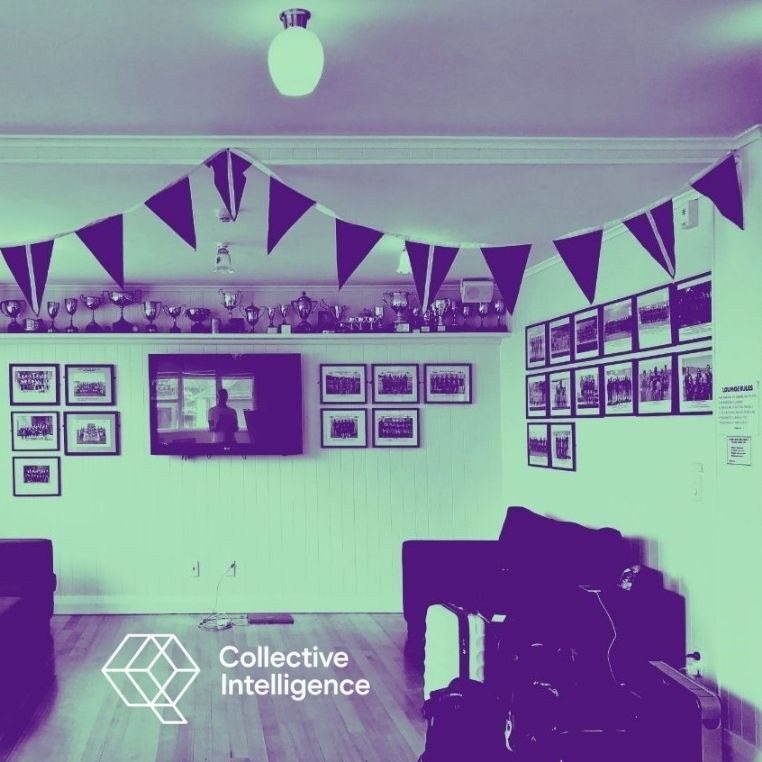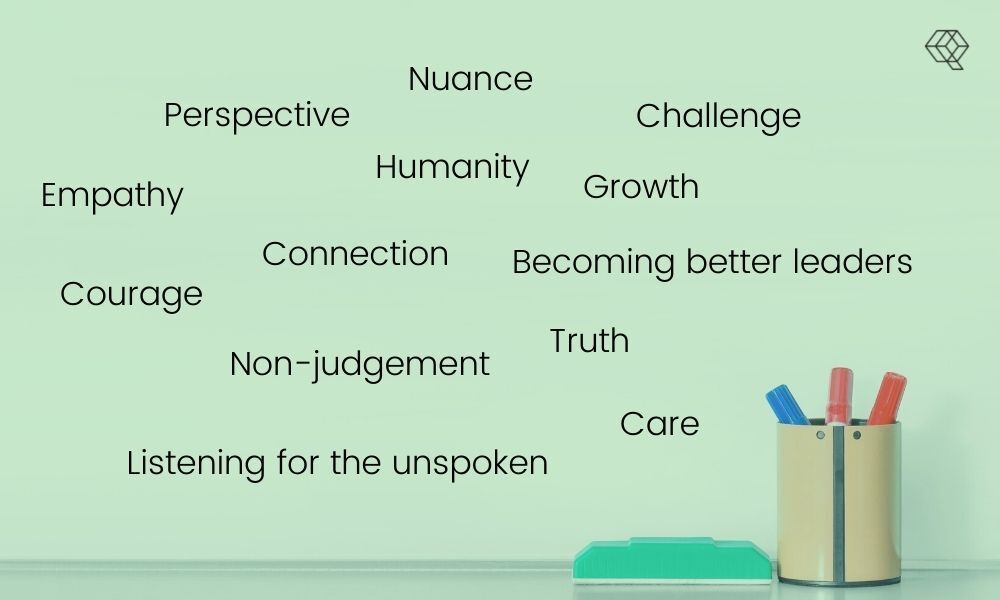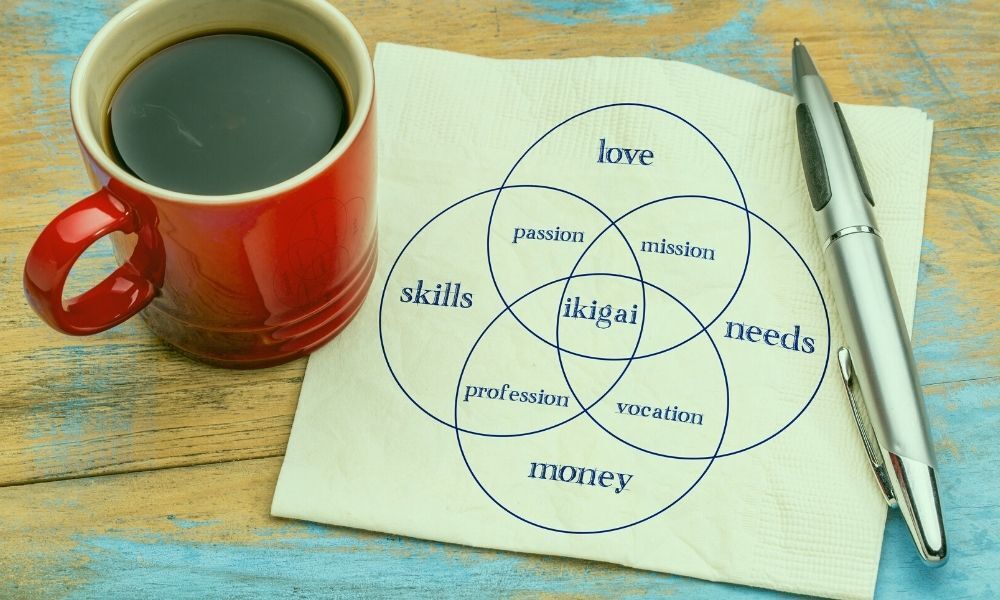Ph: 06 280 0938
The Unfolding Evolution of a Collective Intelligence Team – Part IV

This is the final in a four-part series documenting the evolution of an actual Collective Intelligence team, and covers the most recent work of the team together. Our guest blogger and their team requested anonymity so they can tell their story openly and from the heart. Names have been changed. Read the earlier blog articles here: Part I | Part II | Part III
Note: In a few key places, Collective Intelligence founder Ian ‘Harv’ Harvey, adds his perspective to the team’s unfolding story. His comments show as a popup box when you hover over a phrase with a squiggled underline.
Part IV | METAMORPHOSIS
Sinking our Feet into the Sand
By the end of year number four for the team, we had arrived at a comfortable and powerful place. Each of the team members, save the three who joined in 2020, had experienced a Host Day, and had equally contributed towards providing a well-supported space for others to learn more about themselves.
Meeting number 12 saw us back in Wellington for a team development meeting, at a downtown location on day one, and a beach-side meeting room at the surf lifesaving club at Lyall Bay on day two. Still on major looking-after-the-health-of-the-country duty, Lanie wasn’t able to attend the whole meeting, but it was wonderful to have her along for a couple of hours. Grace called in, as did the new team member from the previous meeting who was unable to make it to Wellington due to a personal crisis. The earlier members of the team took us through a team timeline exercise where they shared much of what had occurred before I had joined the team. Collective Intelligence teams are complex, dynamic and ever-changing. A lot like life, and a lot like humans.
"When I first entered Collective Intelligence, I was expecting a personal development course. However, our group doesn’t operate like that. Over the years it is like we have formed our own rhythm and a dynamic of growing together. With gentle guidance from our facilitator we’ve learnt how to tune into each other, build successful bullshit radars, and co-develop a deeper level of connectedness and understanding. It is with this that we grow as individuals, family members, business owners, and collaborators."
– Grace
Now that the team had matured and got to a place where everyone felt like we were humming, both Marshall and Jayson ran the team through a series of discussions and exercises exploring who we were as a team. We considered how we were feeling about our team? What was it that made this team work, for the most part, when some other Collective Intelligence teams have not evolved? Why was this team so important to us all, and what was our value proposition? How had the narrative of the team shifted over time, and how could we ensure we kept on functioning as a high performing team?
Being in sight of surfers enjoying a lazy Friday, and the ebb and flow of the waves was a great reminder that no matter how personal dynamics and the individuals might have morphed and changed over time, it is clear to everyone that the team itself is sacrosanct. We all share a great deal of trust in each other. That doesn’t mean that it’s always easy. There are many strong personalities in our team, each coming from very different backgrounds and perspectives. Sometimes it’s hard. Sometimes there is conflict. But we are able to push and challenge each other with a sort of radical candour that comes from a place of respect and deep care.
"Every time I leave a meeting, I’ve got some new insight, sometimes hard-gained. This team challenges my assumptions and blind spots. They do so with grace and know just how far to push. The diversity of thought makes me a better agent of change."
– Melanie
During Jayson’s exercise, he invited everyone to create sticky notes for Wins, Pains and Jobs to be Done. It was great to look back and reflect on the highs of the previous four years, and which bits had felt a bit crunchy. Our Wins included things like conflict being okay, learning our true value, experiencing ‘F*ck Yeah’ moments, and learning to love life. Our brainstorming of our Pains was followed by a brainstorming of our future Painkillers, with the view of continual growth and improvement in how we show up for each other.
The Future is Evolution
After beginning to unpack a lot surrounding the group’s development together, the team opted to have a second team development meeting again in March 2021, rather than centre it around a Host Day. The meeting provided a good opportunity for us to further hone in on what it was that provided such a powerful experience for us all.
Throughout the entire journey, one person who I haven’t discussed too much to date is our team facilitator Sophia. Much of the team’s successes in moving through conflicts and learning to give each other space to speak has been aided by her deft facilitation skills, which blend the firm with the empathetic. Sophia possesses an innate sense of when a tangent in discussion might be fruitful and yield unexpected results, and when it might be going off track in a way that won’t be helpful. In a room full of strong personalities, she has also been fantastic at keeping us to time – a much-appreciated gift to a group of people who have taken two days out of their busy lives.
In a first for the team, Sophia facilitated the meeting remotely. She had warned the team that she would be in the United States at the time of this meeting, and had raised the question of whether we wanted to bring in an alternative facilitator, given how much the nuance of meeting dynamics play out in the room. But we couldn’t imagine working with another facilitator, and so between some facilitation of our own, and regularly checking in with Sophia on the big screen, we got by.
"The team have been willing to explore and go with whatever I can bring out of my facilitator hat – this has been encouraging to take risks and bring more to my role. It has been rather delightful to receive their enthusiasm and willingness."
– Sophia
While Sophia appeared in pixels, it was wonderful to have Grace there in person for the first time in a year. She scheduled a work trip back to New Zealand around the team meeting dates, spending two weeks in managed isolation, as per the Government requirements around new arrivals in this time of COVID. It was wonderful to have some real life hugs and share a meal together in the evening. Her business had been going really well, with some cornerstone investors secured, and the product trials moving faster than expected. We lost a team member who had been with us for two meetings, as after they decided that they had too much going on in their life to commit to Collective Intelligence. We were still missing Lanie, who was busy dealing with a recent cluster of COVID cases in Auckland. It prompted a brief discussion around what it meant to have an absent team member. Maree had just celebrated her first-year anniversary of sobriety and was loving it, while Tony shared some struggles with how the massive shakeup of education policy surrounding polytechs and training organisations was impacting his business. Other team members seemed to be doing really well, in both their personal and professional lives.
Much of the meeting was taken up with deciding upon a new team name, having agreed we had outgrown our old one, and also trying to figure out exactly what our vision was as a team. We ran a brainstorming exercise using an adapted version of the Japanese concept of Ikigai – which translates to “reason for being”. We didn’t land on a nice, tidy vision statement, as is the norm in many organisational teams. Instead, what we ended up with was many dozens of words that aptly described our team’s reasons for being. We whittled them down to a smaller list of thirteen that sums up our team nicely:


"A compass is more important than a map. Maybe I need to know where we’re heading, rather than how to get there."
– Jayson
Having had a few members join the team in the previous 12 months, the team discussed better defining our kaupapa and expectations of team members. Since the very first meeting, there had been a long-standing “rule” in the team that you couldn’t quit without fronting up to a meeting first – but it wasn’t written anywhere and it wasn’t explained to new members. So, we agreed to develop a team charter of sorts that will be presented to new members at the beginning, explaining our kaupapa and setting out expectations of the group. It was also agreed upon to request a team call with any prospective new members to the team, before the team gave approval or not – previously, the process was that team members could read a summary provided by would-be members. Collectively the group thought that vetting new members on a call would be a better process than the narrow view provided by written words alone.
While we went through the process of renaming ourselves, our team also decided that they didn’t think the term “Host Day” felt right for us to describe the complex, beautiful and vulnerable process that Collective Intelligence members volunteer themselves for when they invite intense scrutiny into their lives and careers. We decided upon the alternative “Hotspot Day”, given that team members are in the spotlight, and things sometimes get a little uncomfortable. Perhaps it’s a term that might catch on across the network? Discussion around how the process could be improved saw us agreeing that there could be a lot to be gained from having the team help the person in the hotspot (i.e. formerly, “the Host”) to define their question or challenge that they were honing in on. Asking the right questions is crucial to getting the most out of Collective Intelligence, so we figured it makes sense to draw on all your resources and support to define what the key question(s) should be going into a Hotspot Day. We agreed to prototype having a half hour team call a month or two before a Hotspot Day to help the member best define their guiding question and get the most out of their day.
A huge point of both celebration and sadness for the team at this meeting, was Marshall’s imminent departure. Celebration due to the four years of incredible wisdom and thoughtful reflection he had brought to the team, and sadness that we were losing such a pivotal member who had been with us since the very beginning. Marshall was moving back to the United States to be closer to family, and while there was brief discussion of him remaining with the team and calling in on Zoom, he pointed out the cyclical, dynamic nature of life, and that it was time for the team’s next phase of evolution.
"I feel our Collective Intelligence group process is one of distillation. It takes that which is complex and brings it back to simple."
– Marshall
Marshall’s final parting gift to the team was to run us through an embodiment exercise involving a diversity of fancy hats. Each of the six hats represented six key humanistic virtues identified in a positive psychology book that he uses a lot in his leadership work, Character Strengths and Virtues: Wisdom, Justice, Humanity, Courage, Temperance, and Transcendence. We took turns wearing the hats and discussing what these virtues meant to us. While the inclusion of Temperance had me conjuring up images of chastity, darning by candlelight, and ladies in bonnets, Marshall explained that in the context of leadership it meant forgiveness, humility, and self-control. The most potent moment of this exercise was coming to realise what was meant by Transcendence in this context – that is, having a sense of connection to the larger universe and providing meaning, through practicing gratitude, hope, playfulness, humour and nurturing a sense of spirituality, whatever that means to us. Perhaps this is what this team is really about, tapping into those lesser appreciated strengths of what it means to be a great leader.
"Having an elder in the team has been of great value to ground the team in deep values, keeping everyone tracking towards their real contribution to life and the world."
– Sophia
Humanity is investing billions of dollars into Artificial Intelligence and technology that may or may not make our lives much better. Yet many of us have so much to learn about our own intelligence – our cognitive, psychological, and emotional intelligence as messy, beautiful, complex human beings. What our team has learned over the past four years on our Collective Intelligence journey, is that really the only way to define the network is as one giant social psychology experiment to make us better humans. It is an experiment full of not like-minded people, but rather like-hearted people – those who trust the process, their teammates, and their facilitators to help them achieve whatever it is they want to do with their limited time on this Earth. And I’m fully on board with that.
Key Learnings
- We have so much to learn from others who think differently.
- The Collective Intelligence process is highly emergent. The changes are not predicted, but rather anticipated.
- While calling in on Zoom is less than ideal, we can make it work when we need to.
- Having a diversity of age around the table is such a gift.
- Radical candour is a blessing and a gift for the receiver.
- ‘We’ is better than ‘Me’.
- This team is full of love, and for that I am so grateful.
Editor’s Note: We too are very grateful to our anonymous blogger and their team for sharing their journeys of inner discovery with us.
Collective Intelligence 2022 ©

